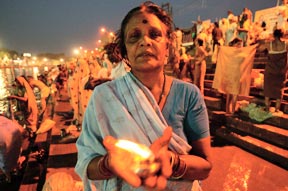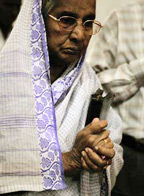Cybercolumn by Brett Younger: Leave the lights on_11005
Posted: 12/29/04
CYBERCOLUMN:
Leave the lights on
By Brett Younger
Every once in a great while, I see a jogger and react in a way that is incomprehensible to thinking people: I say to myself, “I should start jogging.”
(I recognize that many intelligent people feel the more understandable response to runners is to turn the steering wheel ever so slightly so that they run back up on the curb where they belong.)
My unexplainable longing to jog usually doesn’t last long enough for me to put on my tennis shoes, but on rare occasions, I forget how much I hate jogging and run (throughout this column, I will be using the verb “run” in the broad, general sense) for a few days. The key to my success as a runner (I am using the noun “runner” in the same general sense) is that I don’t run very far (I am not embarrassed by embarrassingly short distances) or very fast (it can take several minutes for me to pass a parked car). The only part of jogging at which I excel is “jogger’s face.” While runners claim that they enjoy running, the look on most jogger’s faces is complete anguish. Even though I don’t jog far enough or fast enough to qualify for any genuine anguish, whenever a car or another jogger passes I huff and puff and contort my face as if my heart, lungs and every muscle in my body are about to explode. When they are out of sight, I sit on the curb and rest.
| Brett Younger |
For a couple of weeks, I ran around a couple of blocks near our house. The whole trip was less than a mile. (I say this only to prove that I was telling the truth when I said that I am not embarrassed by embarrassingly short distances.) The highlight of my jaunt was an out-of-the-ordinary yard about 4/10 of a mile from our house. At night, when the lights are on, you can spot it from about 3/10 of a mile away. The most striking feature is the Christmas lights. The lights, which are in a Mulberry tree, are a startling variety of colors. There’s also a red birdhouse with a black roof and an invitation to “See Rock City.” A big red bow adorns a holly wreath. Orange, purple, pink, red and white gladiolas and lilies cover every spare inch. I hope I never have to use my jogger’s face near this spot, because it’s hard not to smile at this yard.
Not long after I started jogging, I had a conversation with some people who lived in the area. I asked: “What’s the story with your neighbor’s Christmas lights? That’s an interesting yard.” They quickly made it clear that the yard is not as amusing to them as it is to me: “Those stupid Christmas lights have been up for years. … It makes me furious when I think about what that yard does to my property values. … I am sorely tempted to buy a BB gun just to shoot those lights. … &%$*!”
I started to rethink my feelings. Perhaps the yard wasn’t as wonderful as I originally thought. Maybe I would feel differently if I lived nearby. Perhaps 4/10 of a mile into my run, I was experiencing the “jogger’s euphoria” about which veteran joggers talk.
One Sunday evening, I was gradually, leisurely making my way around the neighborhood when I saw a woman working in “the yard” just up ahead. I sped up so that 10 minutes later, when I was in need of a break anyway, I was able to stop and say: “Your yard is really interesting. Is there a story behind the Christmas lights?”
She smiled and said, “Yes, there is.” She pointed to the house across the street and identified a particular window. “The elderly woman who lives there came to stay with her children seven years ago. She’s in her nineties now and seldom leaves her room. After her first Christmas here, she went on and on about how much she enjoyed looking at the lights and bright colors in our yard. We’re the only view she has. When Christmas was over, we didn’t have the heart to take the lights down. We decided that as long as she’s around, we’ll leave the lights on.”
How many times are our aggravations someone else’s Christmas lights?
Leave the lights on.
Brett Younger is pastor of Broadway Baptist Church in Fort Worth and the author of “Who Moved My Pulpit? A Hilarious Look at Ministerial Life,” available from Smyth & Helwys (800) 747-3016.



